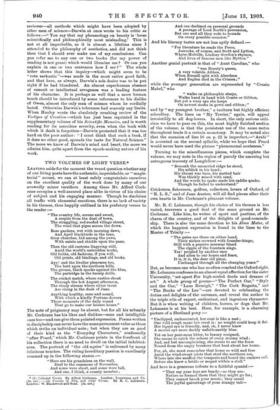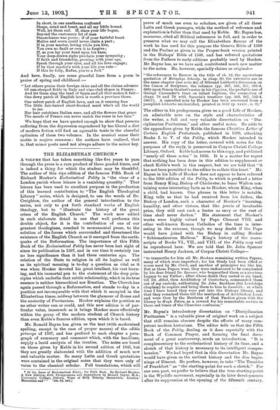TWO VOLUMES OF LIGHT VERSE.* LEAVING aside for the moment
the vexed question whether any of our living poets have the authentic, imperishable, or " magis- terial" accent, we can at least safely congratulate ourselves on the excellent quality of the work done by many of our avowedly minor versifiers. Among these Mr. Alfred Coch- rane occupies a well-assured place alike in virtue of his choice of subject and his engaging manner. Though he disclaims all traffic with elemental emotions, there is no lack of variety in his themes, thus happily outlined in his prefatory verses to the reader :—
" The country life, serene and sweet, A respite from the dust of town,
The straggling, red-roofed village street, The wind that pipes across the down.
Rose gardens, wet with morning dews, And April blackbirds in the lane, Grey churches, hid among the yews, With saints and shields upon the pane.
Then the old customs lingering still, Amid the world's untrodden nooks, Old faiths, old fashions, if you will,
Old prints, old bindings, and old books.
Aye! and the livelier pleasures too, The butt upon the northern hills, The grouse, black specks against the blue, The partridge in the turnip drills.
The cricket match, where rustics shout Through the hot August afternoon, The shady stream where silver trout Are rising in the dusk of June.
Anything healthy, sane and sound, With which a kindly Fortune dowers Those moments of the daily round That go to make our leisure hours."
The note of poignancy may be absent, but for all his urbanity Mr. Cochrane has his likes and dislikes—sane and intelligible ones too—and can give them pointed expression. Poems written in discipleship can never have the same permanent value as those which strike an individual note ; but when they are as good of their kind as the "Everyday Characters," confessedly "after Praed," which Mr. Cochrane prints in the forefront of his collection there is no need to dwell on the initial indebted- ness. The portrait of "the old squire" is enlivened by many felicitous touches. The ruling hereditary passion is excellently summed up in the following stanza :—
" Here are his grandsires on the wall,
Deaf to the summons of November, And some were short, and some were tall, And one, I think, a county member ;
• (1) Collected Verses. By Alfred Cochrane. London : Longman and Co. E5s. net.]—(2 Crumbs of Pity, and other Verses. By B. C. Lehmann. London : W. Blackwood and Bone. De. net.)
And one declined on personal grounds A peerage of Lord North's persuasion, But one and all they rode to hounds On every possible occasion."
And his literary tastes are not less aptly defined :—
" For literature he reads the Times, Jorrocks, of course, and Scott and Lytton, Whyte-Melville, Lindsay Gordon's rhymes, And lives of famous men like Mytton."
Another genial portrait is that of " Aunt Caroline," who " was Beauty's queen, A very volatile Althea,
When Russell split with Aberdeen And Raglan died in the Crimea;"
while the younger generation are represented by " Cousin Mabel," who
" walks on philosophic steeps, Walks hand in hand with Comte or Gibbon, But yet a wary eye she keeps
On newest modes in gown and ribbon;"
and by " my youngest brother," a taciturn but highly efficient schoolboy. The lines on " My Terrier," again, will appeal irresistibly to all dog-lovers. In short, the only serious criti- cism we have to pass on this, the most highly finished section of the volume, is that the persistent use of the same metre throughout lends it a certain monotony. It may be noted also that the scansion of line 16 on p. 22 is imperfect,—"Arabi " is accented on the second syllable, while we hope that Praed would never have used the phrase "phenomenal acuteness."
Turning to the miscellaneous pieces, which complete the volume, we may note in the region of parody the amusing but outrageous travesty of Longfellow :—
" Beneath the uncarried ridge he stood, His niblick in his hand ; His throat was bare, his matted hair Was thickly mixed with sand, And the words he spake made his caddie quake, Though he failed to understand."
Cricketers, fishermen, golfers, collectors, lovers of Oxford, of " R. L. S.," and of Jane Austen, will all find pieces after their own hearts in Mr. Cochrane's pleasant volume.
Mr. R. C. Lehmann, though his choice of his themes is less varied, traverses a good deal of the same ground as Mr. Cochrane. Like him, he writes of sport and pastime, of the charm of the country, and of the delights of good-comrade- ship. There is also the same devotion to his Alma Mater, of which the happiest expression is found in the lines to the Master of Trinity:— "The gates are there on either hand,
Their niches crowned with founder-kings; Still with a pensive murmur bland The ripple of the fountain sings.
Yes! peopled by another race And alien to our hopes and fears, It is, it is, the dear old place, Unchanged through all the changing years."
But, as becomes one who has so often coached the Oxford eight,. Mr. Lehmann confesses to an almost equal affection for the sister University, "set apart For high-souled deeds and dreams of art." A whole group of poems—" The Perfect Oar," " Style and the Oar," " Laus Remigii," " The Cork Regatta," and " The Banks of the Lee "—are devoted to celebrating the duties and delights of the oarsman, and reveal the author in the triple role of expert, enthusiast, and ingenious rhymester. But it is when writing of children, horses, or dogs that Mr. Lehmann is at his beat. Here, for example, is a charming
picture of a Shetland pony :—
" Unclipped, undesecrated, her coat is like a mat ; One wild rough mane her crest is : no weight could keep it flat.. Her liquid eye is friendly, and, oh, I never knew A mortal eye more darkly unfathomably blue.
Yet on her peat-moss litter, to luxury resigned, She seems to catch the echoes of every stormy wind ; And, sad but uncomplaining, she seems to see the foam Tossed from the angry breakers that beat about her home..
For, ah, she must remember that home so wild and free Amid the wind-swept islets that stud the northern sea, Where late she snuffed the tempests and heard the curlews can; Before she knew a bridle or moped within a stall."
And here is a generous tribute to a faithful spaniel :— " They say your legs are handy—so they are: Nature so formed them that they might go far; They cannot brook your music ; they assail The joyful quiverings of your stumpy tail- In short, in one anathema confound
Shape, mind and heart, and all my little hound. Well, let them rail. If, since your life began, Beyond the customary lot of man
Staunchness was yours ; if of your faithful heart Malice and scorn could never claim a part ; If in your master, loving while you live, You own no fault or own it to forgive ; If, as you lay your head upon his knee, Your deep-drawn sighs proclaim your sympathy ; If faith and friendship, growing with your age, Speak through your eyes, and all his love engage; If by that master's wish your life you rule— If this be folly, Rufus, you're a fool."
And here, finally, are some graceful lines from a poem in praise of spring and childhood :-
" Let others praise their foreign skies and all the claims advance Of sun-steeped fields in Italy and vine-clad slopes in France ; And let them sing the land of Spain and all that makes it fair— One dewy patch of English lawn is worth a province there.
One velvet patch of English lawn, and on it running free The little fair-haired short-frocked maid who's all the world to me.
Her hair outshines Italian suns, and all the flowers that grace The meads of France can never match the roses in her face."
We hope that we have quoted enough to show that persons suffering from the depression engendered by too liberal a diet of modern fiction will find an agreeable tonic in the cheerful optimism of these two volumes. In the musical sense their motto is majora canantus : the authors have realised, that is, that minor poets need not always adhere to the minor key.











































 Previous page
Previous page